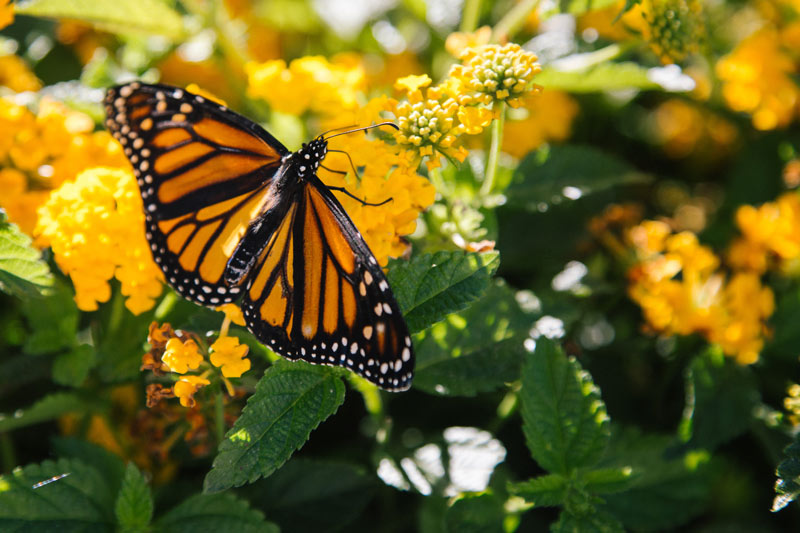
A monarch butterfly in Grover Beach, Calif. Photo by Kyle Glenn/Unsplash
If you’ve ever considered adding plants that support monarch butterflies or other pollinators to your golf course, there’s no better time than the present to give that idea wings (eye-catching orange-and-black wings at that).
Audubon International’s Monarchs in the Rough program is offering free native milkweed and wildflower seed to golf course superintendents in 28 states to facilitate the creation of on-course oases for monarch butterflies. The species has experienced a staggering downturn in population — in part because of habitat loss — that has edged it close to extinction. According to the Xerces Society, an international nonprofit dedicated to insect conservation, monarch butterfly numbers have declined 80% to 99.4% across the U.S. since the 1980s.
The silver lining when it comes to monarchs? “They’re very resilient, and if we provide the habitat, they use it,” Scott Hoffman Black, executive director of the Xerces Society, told GCM in 2016. “Anybody can take action — a golf course, a homeowner — by putting in and maintaining a high-quality habitat.” (Get insight from Black on situating your monarch plot, preparing the site and more in Making a way for monarchs.)
As professional land managers whose network of canvases spans the nation, golf course superintendents are in a unique position to help save monarch butterflies through habitat establishment.
The ingredients essential to monarch butterfly habitat are native milkweed and nectar-producing flowers — the adults need the fuel from nectar-rich plants to make their annual 3,000-mile round-trip migration, and milkweed is the only plant that monarch larvae eat.
Monarchs in the Rough assists superintendents with planning, installing and managing monarch habitat, providing the know-how needed to incorporate such areas into the layout of any golf course. To date, more than 550 golf courses have joined the effort, supplying more than 700 acres of monarch habitat.
Free, regionally appropriate seed from Monarchs in the Rough is available to superintendents in the following states:
Arizona
Arkansas
California
Colorado
Idaho
Illinois
Indiana
Iowa
Kansas
Louisiana
Michigan
Minnesota
Missouri
Montana
Nebraska
Nevada
New Mexico
North Dakota
Ohio
Oklahoma
Oregon
Pennsylvania
South Dakota
Texas
Utah
Washington
Wisconsin
Wyoming
Superintendents can sign up for free seed from Monarchs in the Rough via this online form, or they can do so by emailing Kat Findlay, environmental program specialist at Audubon International. If your golf course is already a member of Monarchs in the Rough, you’re invited to sign up to receive additional seed to expand your habitat area.
More on monarchs and golf courses
Check out the following resources for further information and ideas, and to hear from superintendents who’ve successfully established monarch butterfly habitat in their golfscapes.
Making a way for monarchs
This primer offers how-to for establishing a haven for monarch butterflies on a golf course, and also spotlights the monarch-welcoming work of GCSAA Class A superintendent Isaac Breuer at Gustin Golf Course in Columbia, Mo., where monarch conservation has long been a focus.
Brad Boyd, director of agronomy at Dorado Beach Resort & Golf Club in Puerto Rico, talks about the facility’s efforts to propagate milkweed for monarchs as well as be a home for hundreds of the butterflies:
Pollinators in the turfgrass ecosystem: Best management practices
Protecting and preserving pollinators through pesticide stewardship and best management practices is imperative for the turfgrass industry. Here are guidelines for doing just that.
Planting milkweed for monarch butterflies at Meadow Club
David Sexton, CGCS, shares tips gleaned from experimenting with various milkweed planting methods at the California golf course.
Advocating for western monarchs at Stewart Meadows Golf Course
The nine-hole facility in Medford, Ore., has five certified monarch waystations, which are a rarity in the Pacific Northwest.
Host a children’s pollinator workshop at your golf course
Pair community outreach with pollinator stewardship by introducing local youth and their families to your golf course and the importance of pollinators. Connecticut superintendent Peter Gorman shares a blueprint.
Megan Hirt is the editor of GCMOnline.com.